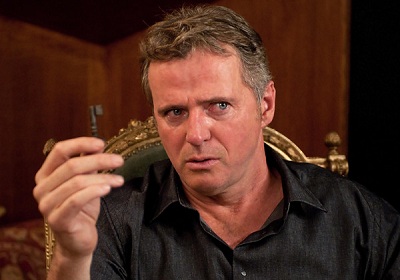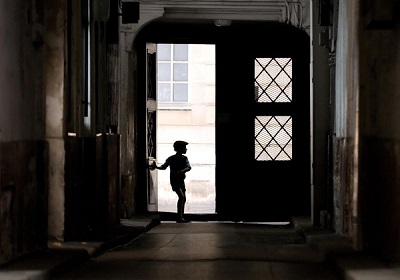Sarah's Key DVD Review
-thumb-430xauto-23426.png)
Paris 2009; a journalist Julia (Kristen Scott Thomas) becomes obsessed with a discovery in her family that leads to a young girl whose own family was torn apart during the notorious Vel' d'Hiv Roundup of the Jewish people.
1942 Paris, and young Sarah (Mélusine Mayance) as the stand out as this incredibly brave and intelligent little girl, is playing with her brother and it is only these opening moments of genuine happiness that exist in Sarah's Key. This is Nazi occupied France and Sarah is Jewish, the French police arrest them and she is taken to the velodrome along with her mother and father. In 2009 Julia comments on the velodrome 'like the stadium during hurricane Katrina only a million times worse'. Flashback again to Sarah and her family, as Sarah has to live with a terrible decision she has made.
This is how Sarah's Key
progresses, flashbacks and forwards which are jarring but ultimately work to
explain a truly tragic set of events that bring to light the mystery of Sarah's
key. This pacing is ingenious, particularly in the first half of the film as
the present gives cues and clues to the accompanying past scenes, but by the
latter part of Sarah's Key the
intense survival horror turns to tepid family drama and there is too much focus
on Julia and her situation.
Sarah's Key's strongest moments lie in the past, when Sarah
is a child and must survive the ordeals of the velodrome, the transport camp
(one step away from the notorious concentration camps) and the wilderness.
These scenes would not work if each setting was not authentic but fortunately
no detail has been spared, and these scenes evoke a strong emotional response
as they seem all too real. Initially the apartment is given a strong focus,
when Sarah and her family are removed in 1942 the police close the curtains,
only for it to flash forward to 2009. The same apartment, more modernized, but
retaining the same aesthetic, shows Julia opening the curtains which is a
magical moment that makes it appear as though the apartment has been seemingly
untouched since then.
The
velodrome, a massive stadium housing thousands upon thousands of Jewish people
is incredible and one scene pans the chairs in the stadium and the oppressive
hopelessness felt by the coughing, bleeding, sweating and exhausted
inhabitants. Later the camp is given a similar feeling of despair, but the film
transforms when Sarah flees; the fields are a majestic sight, golden and
symbolic of her newfound freedom. Later she stumbles into a small village,
desperate and starving, each little cottage has an authentic look that easily
invokes the feel of the place and period.
The
atrocities committed during this time are reflected so convincingly in Sarah's Key it was hard not to feel
genuinely angry and upset. An example of this was in hearing Julia interview an
old woman who lived next to the velodrome at the time; the sound was not the
problem, she says, it was the smell of the place. Another atrocity is poor
little Sarah and her immeasurable burden and the mysterious key she cannot live
without. Her journey after escaping the camp is filled with hardships and heart
break, and when she does eventually return to her original home in Paris it is
a scene that is inevitable, but tragic.
In the
present Julia continues to write her article about this atrocity, and visiting
a holocaust museum is told something by the curator that shapes her connection
to Sarah and the reasoning for the strong emotion that overwhelms the film. He
says to her that he tries to escape the statistics. Indeed many Jewish people
were killed but Sarah's Key focuses
on one particular individual whose life is forever affected by this atrocity,
and Sarah certainly comes across as more than just a statistic.
Although Sarah's Key focuses on Sarah's journey
to return home, it also focuses on Julia's present quest for the truth about
her. This is a form of escapism for Julia as she travels around Paris and then
the world, to avoid her family, particularly her husband and the sudden
situation she is faced with. This works to an extent, But her family drama is
underwhelming in comparison to the horrific and tragic story she is working to
uncover.

The latter
part of Sarah's Key that deals with
an adult Sarah and the inquest to find out what happened to her comes across as
a rush job and contains none of what was the initial impact. Julia travels to Italy to meet Sarah's son (Aidan
Quinn), and he is mentioned here for only one reason; his performance in this
is terrible and lets the film down considerably. The film drags after we learn
of Sarah's fate and the production values are noticeably on the decline when compared
to the authentic settings and hard hitting survivalist drama the first half
immersed us in.
Sarah's Key is a beautiful resonant film that unearths a
great atrocity and tragedy that France not only had a part in, but was instigators
in, as a move to try and appease the Nazis. But despite the heavy drama, Sarah's Key is unbalanced in that the
first part is considerably better than the latter, and Sarah's ordeal trumps
that of Julia's family melodrama.








